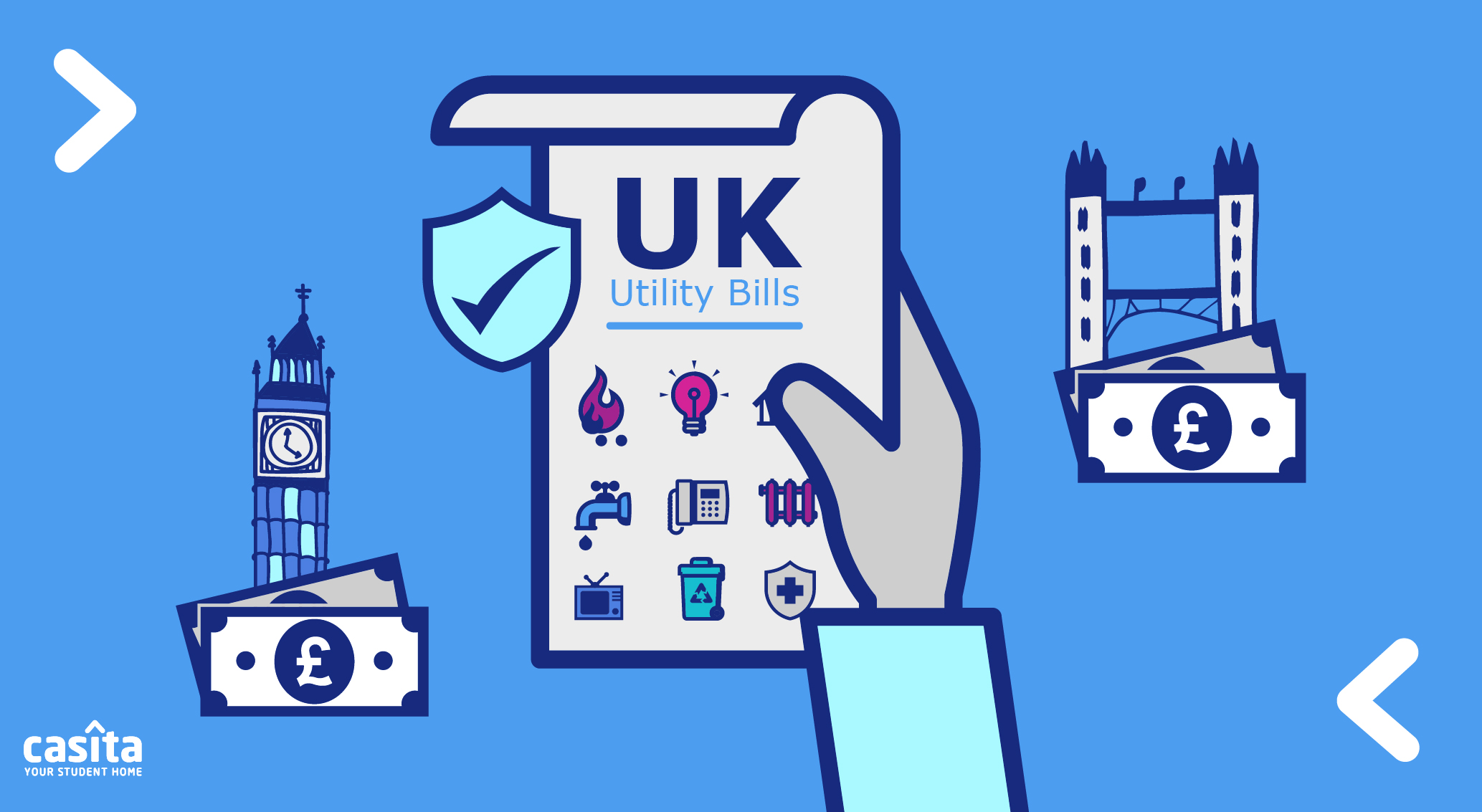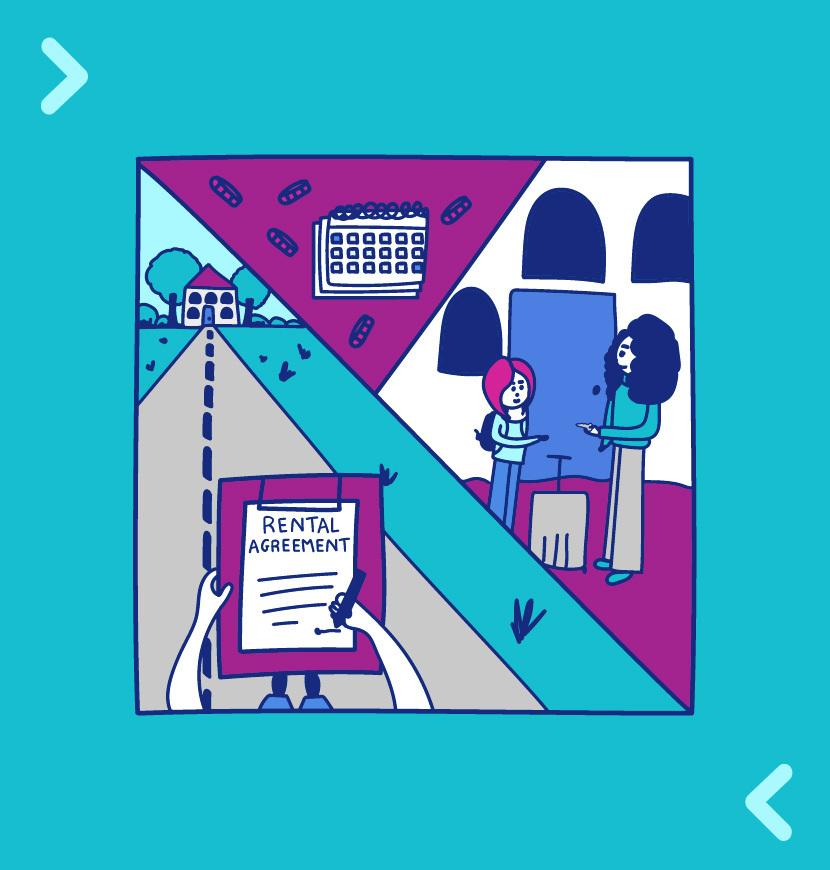UK Utility Bills
Student Housing
Student Finance
6 mins read
Share

Updated at: 25 November, 2025
Published at: 12 April, 2019
By Samir Badawy
UK Utility Bills
Student Housing
Student Finance
6 mins read

Updated at: 25 November, 2025
Published at: 12 April, 2019
By Samir Badawy
Share
One of the essential things to look for when booking your student home after the distance from universities and room features is the rent and utilities. At Casita, we mainly offer and recommend PBSAs, which are purposely built student accommodations, usually including all bills. These bills typically consist of your utility expenses and the city council tax. If no PBSA is available, we can always allocate you private accommodation options.
Regarding private accommodations, utility bills can be included, depending on the rental contract/agreement. So, if you’re new to the UK and looking for student accommodation or renting a private option for the first time, we’ll provide you with everything you need to know about UK utility bills.
Household Bills List (UK) and their Average Costs
Utility bills are all household bills that you incur during your stay. These can range from electricity to water and gas to Wi-Fi and council taxes. The household bills list in the UK in detail is as follows:
Gas and Electricity Bills
These bills are reflected in the amount of energy you consume monthly (gas and electricity). The gas and electricity that you use can be tracked by checking your meter. Pay attention to any unexpected significant increase in your power bill as it might be due to various reasons, such as the company increasing its costs or a faulty meter; be aware of any change that might occur and contact your electricity company if any significant difference does occur.
In the UK, the average household consumes 1,000 kWh of gas and 242 kWh of electricity per month. An electricity unit will cost you 52.968p in addition to a daily charge of 33.206p. A gas unit will cost you 10.331p in addition to a daily charge of 29.106p. Both electricity and gas units are measured in kWh.

Nowadays, various energy suppliers can track your bill costs and consumption online, making the process much easier; they also have e-payment portals if you choose to pay online.
If you’re wondering how to go on about your gas meter readings, you need to first know that each meter differs, as you now have:
Digital metric meters.
Digital imperial meters.
Dial meters.
For electricity, you have the following metres:
Single-rate digital meters.
Two-rate digital meters.
Two rate single display meters.
Dial meters.
All these metres have in common that they represent 4 to 5-digit numbers that can be used to check your consumption with your provider. They will often have a number in red and a large number which should be ignored.
The gas and electricity bill is typically affected by the size of the apartment or unit you live in and the electricity usage; keep reading for more to know how to reduce your electricity costs.
Water and Sewage
Water and sewage are estimated to cost £400 a year, with water bills paid monthly and sewage bills paid once or twice a year. Similarly to gas and electricity bills, you can also check and pay your water bills through the provider’s website.
Wi-Fi
The average Wi-Fi bill will cost an average of £34 per month; however, you can always check online for the cheapest deals. Similarly to other bills, you can always check your Wi-Fi bill through the provider’s website or application.
TV Licence
A TV Licence costs, on average, £159 for a standard colour TV; this licence fee applies to any device you use to watch TV channels and on any platform, such as online TV channels. This licence fee funds the BBC and the media industry in the UK. This TV licence fee is paid annually.
Council Tax Bill
Before paying your council tax in the UK, it is important to check with the local authority whether you have to pay the bill. If so, you can check if you’re eligible for a reduction as a student or if you have a disability. This bill covers various city services such as garbage collection and libraries.
The council tax bill also helps fund various entities that provide public services, such as the police, leisure projects, transportation systems, and more. This council tax is split into 10 to 12 monthly payments, and the tax amount depends on the city of residence, where you reside in the city, and the council tax band (category) you fall into.

Tips on Reducing Utility Costs
Lowering Your Energy and Water Consumption:
Whether it’s water, electricity, or gas, you can always lower your energy consumption in various ways and save money. Always keep in mind that it is in your hand to reduce your costs by limiting electricity usage, the amount of water by limiting the time you typically spend in the shower, and trying to keep gas usage low. When not in use, you can turn off your thermostat as well as your individual radiators. You can also check the energy consumption of your appliances by checking the appliance’s energy performance certificate, which shows how much energy this appliance consumes.
Choosing the Eco-Mode Option:
Many appliances come with an eco-mode setting, which can significantly help reduce the amount of money and electricity costs. Eco-Mode is a function typically found in washing machines and dishwashers. By choosing this option, you use less water and less heating, saving water and energy.
Installing Smart Controls:
Smart controls can come at a bit of a cost in the short run. However, it will definitely save you money in the long run. Smart controls are smart systems that can help monitor and regulate how you use your electricity, gas, and water, giving you more control over your costs. Some systems include smart lighting or even thermostat controls.
Opting for a Fixed Rate Charge
On the electricity and gas bill, you’ll see your usage reflected in Kilo Watts per hour; you can always ask your energy provider to opt for a fixed rate bill which allows you to pay a fixed rate per kilowatt throughout your contract duration. Energy prices can fluctuate due to various factors, such as outside factors or changes in supply.
Lowering Heating Costs
There are various methods to consider if you want to lower heating costs, the first being increasing the efficiency of your heating system, such as bleeding your radiators and maintaining or upgrading your boiler when necessary.
In some older homes, the insulation can be outdated; this is why you can draught-proof windows and doors, upgrade your insulation, and use thermal curtains and blinds. Ensuring a good insulation will ensure heating and energy efficiency.
Utility Bill Government Help
Depending on your eligibility, where you live, and the weather conditions, the government can offer some reductions under various schemes. An example of how the government can provide support due to weather conditions is the 400-pound utility bill reduction Energy Bills Support Scheme, previously applied from October to July 2022.
At Casita, the student housing website, we urge students to carefully consider the utility bill costs before making any booking. Make sure to carefully read the contract, which will specify if the rent includes all bills and always ask about what bills are covered.
When booking a student en-suite room or a self-contained studio at any PBSA, asking about student utilities is essential. Most of Casita’s student buildings in the UK, Ireland and Australia offer student rooms with all-inclusive utility bills. Since we’re in a fast-paced era, all student accommodation in the UK and Australia come with broadband and Wi-Fi. All you have to do is to make sure that it is included in your rent. Some student accommodation give limited packages and sells extra packages for an extra charge. Make sure to ask about this detail.
If you have any questions, please contact our Accommodation Experts on [email protected] and they will walk you through the whole booking process 100% free-of-charge.
FAQs
What is the Average Monthly Electric Bill in the UK
In the UK, the average household consumes 1,000 kWh of gas and 242 kWh of electricity per month. An electricity unit will cost you 52.968p in addition to a daily charge of 33.206p. The lowest yearly payment for a two-person household is £1,706 a year.
What is the Difference Between a Gas Bill and an Electric Bill?
The main difference between gas and electric bills is the terminologies used, such as kWh kilowatt per hour for electricity and gas, and BTU, which stands for “British Thermal Unit”, used to reflect the amount of heating needed to increase the heat of a pound of water by one degree Fahrenheit. Even though you will see your gas bill reflected in kWh, it is essentially measured in cubic feet and converted by your provider.
For gas and electric bills, you can opt for a fixed rate bill which allows you to pay the same amount for a unit of energy, disregarding changes in supply and external factors that can affect the costs.
What is the Average UK Household Utility Bill?
A typical UK household utility bill can cost you £182 per month, including the standard gas and electricity bill. Other costs include Wi-Fi for £34 a month, a TV Licence Fee of £159, and Water and Sewage for £400 a year.
Student Housing
Student Finance
By Samir Badawy
Share
Student Housing
Student Finance
Updated at:
Published at:
By Samir Badawy
Share


